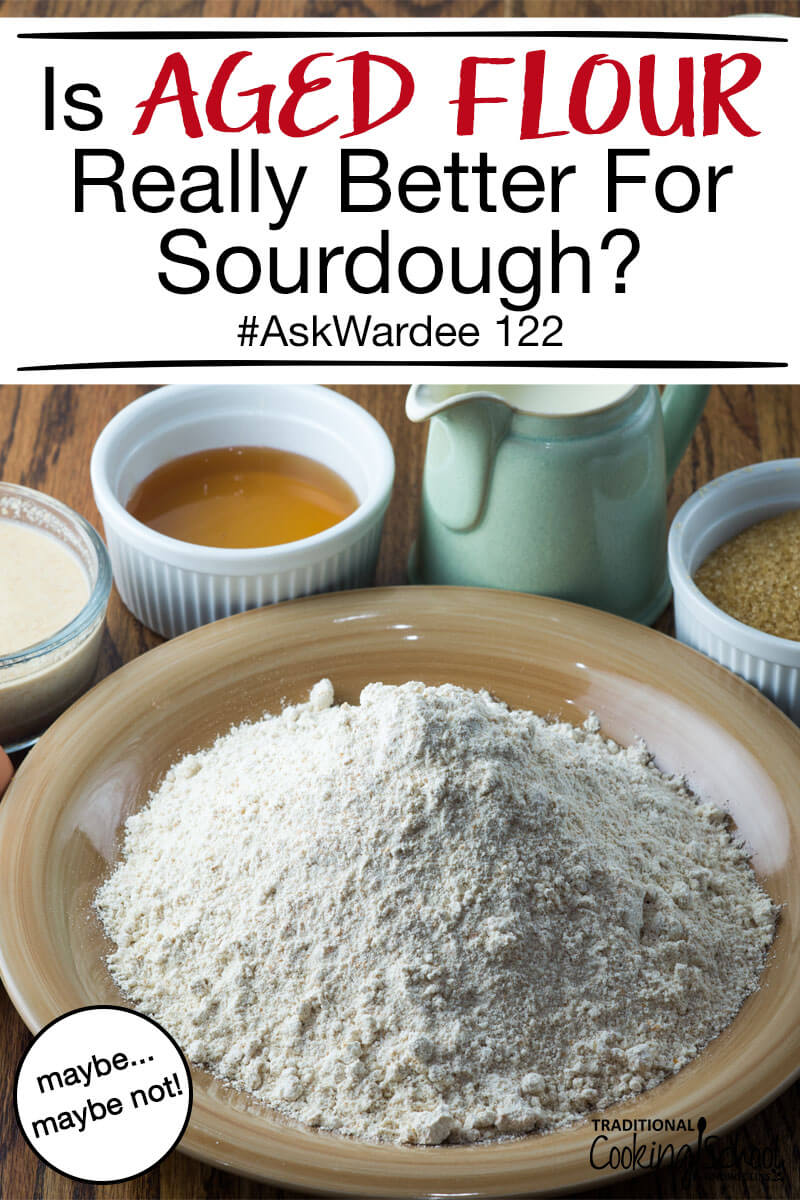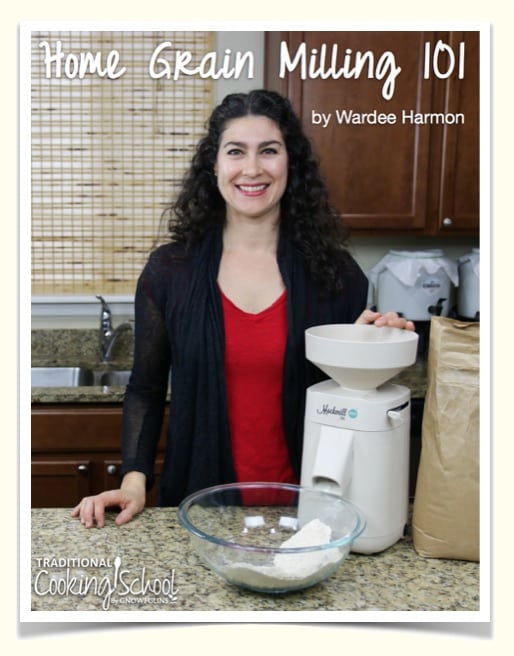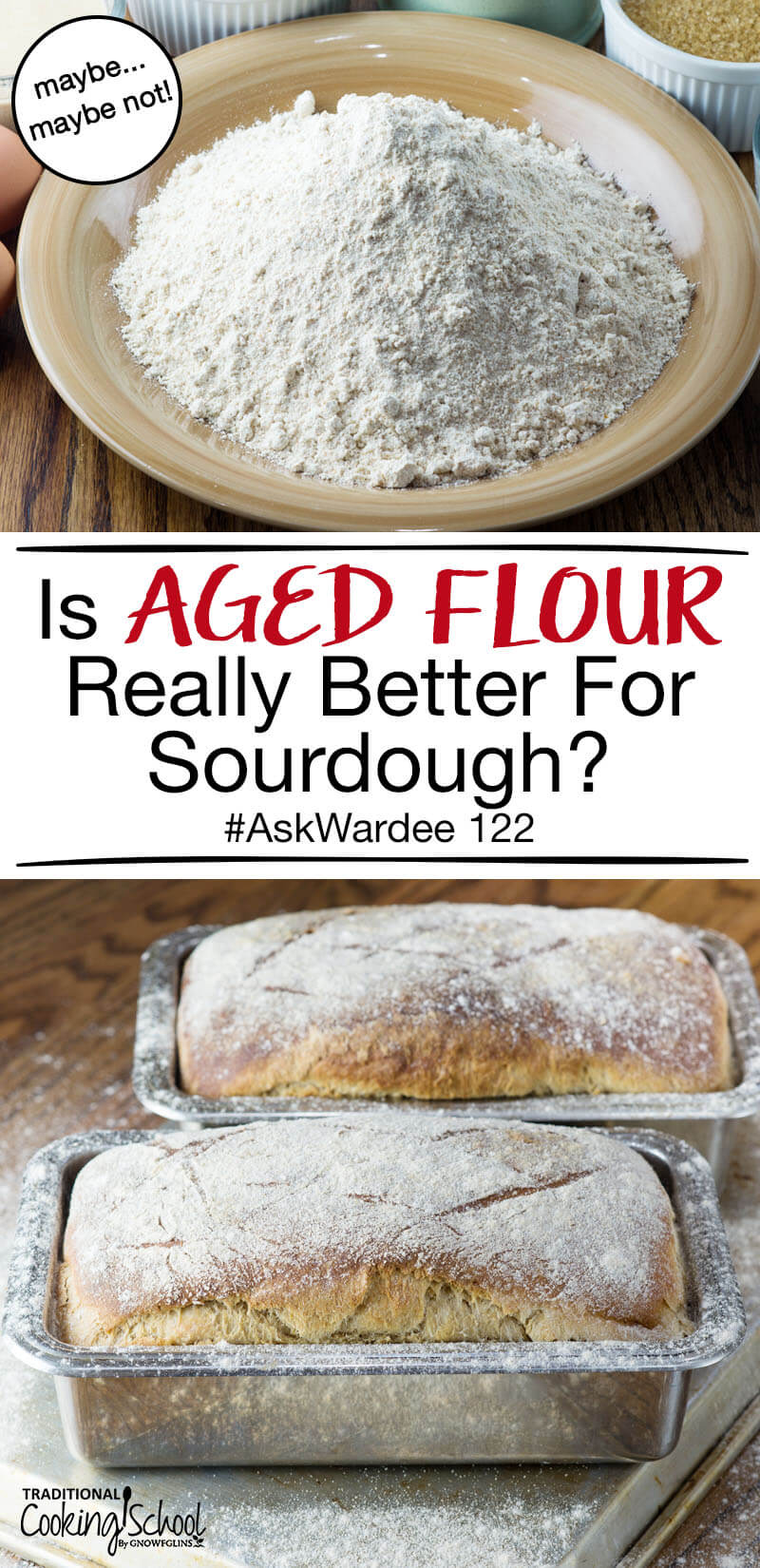
Want our FREE “Home Grain Milling 101” eBook? Click here to download the “Home Grain Milling 101” eBook for FREE!
Clint B. mentioned he ran across the opinion that sourdough recipes and sourdough starters don’t perform as well with fresh-ground flour — and that “aged” or old flour is said to be better.
He asks what my experience is since I am quite vocal about preferring fresh-ground flour. 🙂
I’m happy to share my opinion on today’s #AskWardee, Clint. Thanks for your question!
Subscribe to #AskWardee on iTunes, Stitcher, YouTube, or the Podcasts app.
The Question: Isn’t Aged Flour Better For Sourdough?
Clint B. asked:
I have come across the opinion that sourdough does not respond as well (meaning the starter is not as lively and bubbly) with fresh ground flour as compared to “aged” flour. What is your experience and knowledge of this comparison or contrast?
I see you are grinding your own flour, so I am guessing its performance must be acceptable?
What Is Aged Flour?
Aged flour is flour that has been purposely stored for several months before using.
During that time, oxidation occurs. Which we normally avoid due to nutrient loss, but in this case causes the gluten to be stronger, which then gives a more elastic dough.
True aged flour is more expensive to purchase because it’s more expensive for companies to provide. The product sits there not making money for awhile.
Because of this cost factor, companies often create a fake aged flour chemically. Which is not the healthiest, for obvious reasons. So for anyone seeking out “aged” flour on purpose, be wary of those that are chemically created.
So aged flour is often more expensive or unnatural.
This does beg the question, though… regardless of cost or health, which performs better in sourdough bread?
Which Is Better — Aged Or Fresh?
I prefer to use fresh-ground flour for the health benefits and results. I find that there is no downside to it, especially if the starter is mature and active. A mature and active starter wins out nearly every time!
And in fact, I find my sourdough starter (click here for free instructions) performs better with fresh-ground flour than aged flour.
So the bottom line for me is… stick with fresh-ground. Keep your starter active and bubbly. Then you’ll get great results without sacrificing any nutrition or paying more to get aged flour.
Yet even though I personally prefer to use fresh-ground flour, this doesn’t mean that aged flour doesn’t work for some people.
And if you must use aged flour, make sure to look for true aged flour, not flour that’s been aged chemically… or better yet, buy whole wheat berries and make your own! In #AskWardee 118, I showed how much flour to grind for your recipes.
How To Make Aged Flour At Home
Our team member Sylvia shares that she finds aged flour works better in some recipes. (Yet, she also shares that her starter does better with fresh-ground, especially rye. And I would agree with that! Rye starters using fresh-ground flour are amazing… so active!)
She says:
Most commercially purchased flour is somewhat aged simply because of the time required to get the flour from the mill to the consumer. Ten days of air exposure is all it takes to age flour. In bags, maybe a week. In those big fifty pound bags like I used to purchase, it’s about three weeks because they’re in almost airtight bags and the flour is of course more dense in those bags. Modern milling techniques produce an adequately matured flour.
However, longer aging will create a better aged flour for baking. So, it’s ok to mill flour and store it yourself, as long as you freeze the grains/flour first (for 72 hours) to kill insect larvae and eggs. You can also freeze purchased flour and age it longer yourself. After the freezer treatment, store it in NON-airtight containers at room temperature for another couple of weeks before using it.
I used to keep three bins of flour. The most mature flour was on one end and I used it daily. When it was empty, I rotated the bins to start using the next-older one, while adding new flour to the just emptied out bin so it could begin to age.
So there you have it… how to make your own aged flour. No chemicals. Inexpensive.
Thank you, Sylvia! 🙂
Any Questions Or Comments?
If you have other questions or comments about your own experience with using or making aged flour, be sure to leave them in the comments!
My Favorite Grain Mill: The Mockmill
As you can tell from this series, the Mockmill is my favorite grain mill and the one I recommend! I’ve been recommending it for a year and lots of you have already gotten one in your homes. Mockmill tells me you’re very happy and I’m glad about that. 🙂
The Mockmill is a home stone grain mill, and it’s engineered and manufactured in Germany by Wolfgang Mock. He started making home grain mills back in the 1970s, so he’s been doing it for over 40 years. It’s estimated that nearly 70% of the stone mills out there are made by him.
This mill is super exciting because it contains the best features of Wolfgang Mock’s milling career, yet it’s much more affordable. The reason it’s more affordable is because this mill comes in a durable recycled material housing (instead of expensive wood).
I love the Mockmill because it produces super healthy freshly-ground flour with a really fine texture. It doesn’t warm the flour up like some mills do, so the flour is more nutritious. Finally, the flour yields wonderful, light bread!
This mill will also grind all grains, even gluten-free. It can even crack grains for porridge, and it has many other uses (like some spices, nuts, and seeds).
See How The Mockmill Works In This Video…
All the details — including 5% OFF and FREE SHIPPING — are on this page. By the way, it also comes as a KitchenAid attachment — very exciting for those who don’t want another appliance to take up any more room!
And, for a limited time… if you decide to purchase the Mockmill, I’m ALSO throwing in complimentary copies of both my Sourdough A to Z and Einkorn Baking Mini eCourses. They’re each worth $64 for a total of $128 in additional bonuses from me.
To claim your extra free bonuses from me after purchasing the Mockmill at 5% OFF, just go to tradcookschool.com/millbonus. Have your order # handy, because you’ll need it to claim the two free eBook packages!
 Want our FREE “Home Grain Milling 101” eBook? Click here to download the “Home Grain Milling 101” eBook for FREE!
Want our FREE “Home Grain Milling 101” eBook? Click here to download the “Home Grain Milling 101” eBook for FREE!
Helpful Links
- The Mockmill —my favorite and recommended (affordable) home stone grain mill — Hurry! Get 5% OFF
- Claim your FREE ($128 value) bonuses from me with your purchase of the Mockmill here!
- 8-cup hand-crank sifter
- Free “Home Grain Milling 101” eBook — our entire 4-part series combined into a single, FREE download from me!
- Home Grain Milling 101, Part 1: The Basics
- Home Grain Milling 101, Part 2: Milling Gluten-Free Grains Into Flour
- Home Grain Milling 101, Part 3: Baking With Fresh Ground Flour
- Home Grain Milling 101, Part 4: More Fun Things Your Grain Mill Can Do!
- Do Sprouting, Culturing, Or Sourdough Reduce Carbs? AW905
- FREE Webclass: Baking With Fresh-Ground Flour
- FREE No-Knead Sourdough Einkorn Bread Recipe
- FREE Sourdough Starter Instructions
- Why I <3 Einkorn — in case you want to know why we bake with the healthier 5,000 year-old wheat called einkorn!
- Where To Buy Einkorn
- Nutrimill
More Sourdough Posts from the #AskWardee Show:
- Does Sourdough Bread Get Moldy? +Troubleshooting Dense Sourdough Bread
- Sourdough Tips, Troubleshooting & Frequently Asked Questions
- When Is A Sourdough Starter Ready For Baking? #AskWardee 145
- The Best & Healthiest Flours For Sourdough #AskWardee 065
- Sourdough Troubleshooting: How To Know When Your Starter Is Strong Enough For Bread-Baking
- How To Freeze Your Sourdough Starter {Best Way} #AskWardee 059
- Feeding Your Sourdough Starter… More Than Just Flour! #AskWardee 150
- Can I Use Reverse Osmosis Water For Fermenting, Culturing, & Sourdough? #AskWardee 138
- 5 Tips: How To Prevent Mold During Fermentation #AskWardee 074
- How To Transition A Sourdough Starter To Einkorn #AskWardee 069
Do you use aged flour? Why or why not?
...without giving up the foods you love or spending all day in the kitchen!

2 free books:
Eat God's Way
Ditch the Standard American Diet, get healthier & happier, and save money on groceries...
We only recommend products and services we wholeheartedly endorse. This post may contain special links through which we earn a small commission if you make a purchase (though your price is the same).





Do you just freeze the wheat berries if you plan to age the flour or do you freeze your wheat berries (i.e. from Einkorn.com) even if you are using fresh-milled flour? I used to always freeze store bought flour for that reason, but since I’ve been grinding my own, I haven’t. Wondering if I should?
Hi, Jennifer,
Yes, you should freeze for 72 hours no matter what. There is more information on storage in the Free Home Grain Milling 101 eBook, here is where you can sign up for that: http://tradcookschool.com/milling101
~Peggy, TCS Customer Success Team
LOL…I’ve been aging my own flour for years and didn’t even know it. I buy it before I run out so I put the new one in the freezer until the old one runs out. The old flour is usually in the cupboard for several months before I use it all up and take out the new!
I have been milling and storing about 2 – 3 cups of Einkorn flour in the freezer so that it is ready for feeding my sourdough starter. When I make up the dough I always grind immediately. Since what I feed the starter is stored a short time in the freezer, is this not such a good idea when you want the most nutrition?
Hi Linda,
It’s fine to use the stored flour to feed your starter. However, you want to make sure, for the best nutrition, you’re using fresh ground flour when baking.
~Vicki, TCS Customer Success Team
I started to Mill Whole wheat grains a few months ago, and use the flour to make my bread. The starter I have was fed on shop bought flour. So I pulverised some whole wheat into a pulp and started using that to feed my starter, firstly not to good, but know 3 0or 4 weeks ageing the starter gets big bubbles after 3 or 4 hours, if I leave it overnight it goes down a bit the bubbles get smaller, it still seems to be good. I am a newbie to sourdough, and have been for over a year, but I’m getting there.
Hi, Richard,
Sounds like you are doing great! Great job. 🙂
~Peggy, TCS Customer Success Team